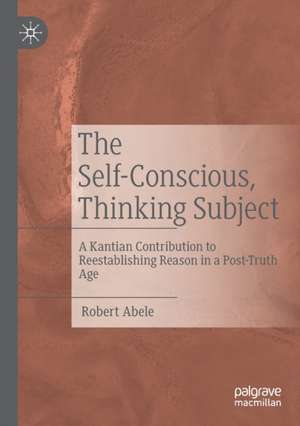The Self-Conscious, Thinking Subject: A Kantian Contribution to Reestablishing Reason in a Post-Truth Age
Autor Robert Abeleen Limba Engleză Paperback – 20 aug 2022
| Toate formatele și edițiile | Preț | Express |
|---|---|---|
| Paperback (1) | 781.45 lei 6-8 săpt. | |
| Springer International Publishing – 20 aug 2022 | 781.45 lei 6-8 săpt. | |
| Hardback (1) | 786.66 lei 6-8 săpt. | |
| Springer International Publishing – 19 aug 2021 | 786.66 lei 6-8 săpt. |
Preț: 781.45 lei
Preț vechi: 952.99 lei
-18% Nou
Puncte Express: 1172
Preț estimativ în valută:
149.55€ • 153.15$ • 124.40£
149.55€ • 153.15$ • 124.40£
Carte tipărită la comandă
Livrare economică 19 martie-02 aprilie
Preluare comenzi: 021 569.72.76
Specificații
ISBN-13: 9783030795597
ISBN-10: 3030795594
Ilustrații: XV, 339 p.
Dimensiuni: 148 x 210 mm
Greutate: 0.43 kg
Ediția:1st ed. 2021
Editura: Springer International Publishing
Colecția Palgrave Macmillan
Locul publicării:Cham, Switzerland
ISBN-10: 3030795594
Ilustrații: XV, 339 p.
Dimensiuni: 148 x 210 mm
Greutate: 0.43 kg
Ediția:1st ed. 2021
Editura: Springer International Publishing
Colecția Palgrave Macmillan
Locul publicării:Cham, Switzerland
Cuprins
1. The Primacy of Judgment.- 2. Judgment.- 3: Synthesis: The Common Form of Judgment and Perception.- 4. Synthesis and the Forms of Judgment in Perception.- 5. The Unity of Cognition in the Synthetic Unity of Apperception.- 6. The Drawbacks of Empirical Metaphoric Reductionism.- 7. The Politics of Negative Ontology: Postmodernism.
Notă biografică
Robert Abele is Professor of Philosophy at Diablo Valley College, USA. He is the author of A User's Guide to the USA PATRIOT Act (2005); The Anatomy of a Deception: A Logical and Ethical Analysis of the Decision to Invade Iraq (2009); and contributed to the Encyclopedia of Global Justice (2012).
Textul de pe ultima copertă
This book argues that the primary function of human thinking in language is to make judgments, which are logical-normative connections of concepts. Robert Abele points out that this presupposes cognitive conditions that cannot be accounted for by empirical-linguistic analyses of language content or social conditions alone. Judgments rather assume both reason and a unified subject, and this requires recognition of a Kantian-type of transcendental dimension to them. Judgments are related to perception in that both are syntheses, defined as the unity of representations according to a rule/form. Perceptual syntheses are simultaneously pre-linguistic and proto-rational, and the understanding (Kant’s Verstand) makes these syntheses conceptually and thus self-consciously explicit. Abele concludes with a transcendental critique of postmodernism and what its deflationary view of ontological categories—such as the unified and reasoning subject—has done to political thinking. He presents an alternative that calls for a return to normativity and a recognition of reason, objectivity, and the universality of principles.
Robert Abele is Professor of Philosophy at Diablo Valley College, USA. He is the author of A User's Guide to the USA PATRIOT Act (2005); The Anatomy of a Deception: A Logical and Ethical Analysis of the Decision to Invade Iraq (2009); and contributed to the Encyclopedia of Global Justice (2012).
Robert Abele is Professor of Philosophy at Diablo Valley College, USA. He is the author of A User's Guide to the USA PATRIOT Act (2005); The Anatomy of a Deception: A Logical and Ethical Analysis of the Decision to Invade Iraq (2009); and contributed to the Encyclopedia of Global Justice (2012).
Caracteristici
Offers a defense of the nature of human reason, from a Kantian point of view Uses Kant to demonstrate the necessary conditions for human cognition that are irreducible to radical empiricist and/or postmodern themes Written for scholars interested in Kant, postmodernism, and/or a defense of reason in philosophy and political theory
